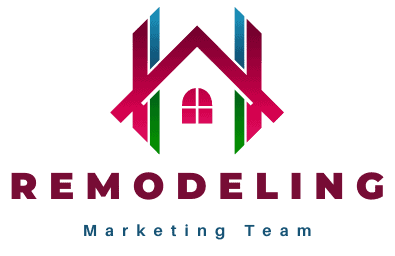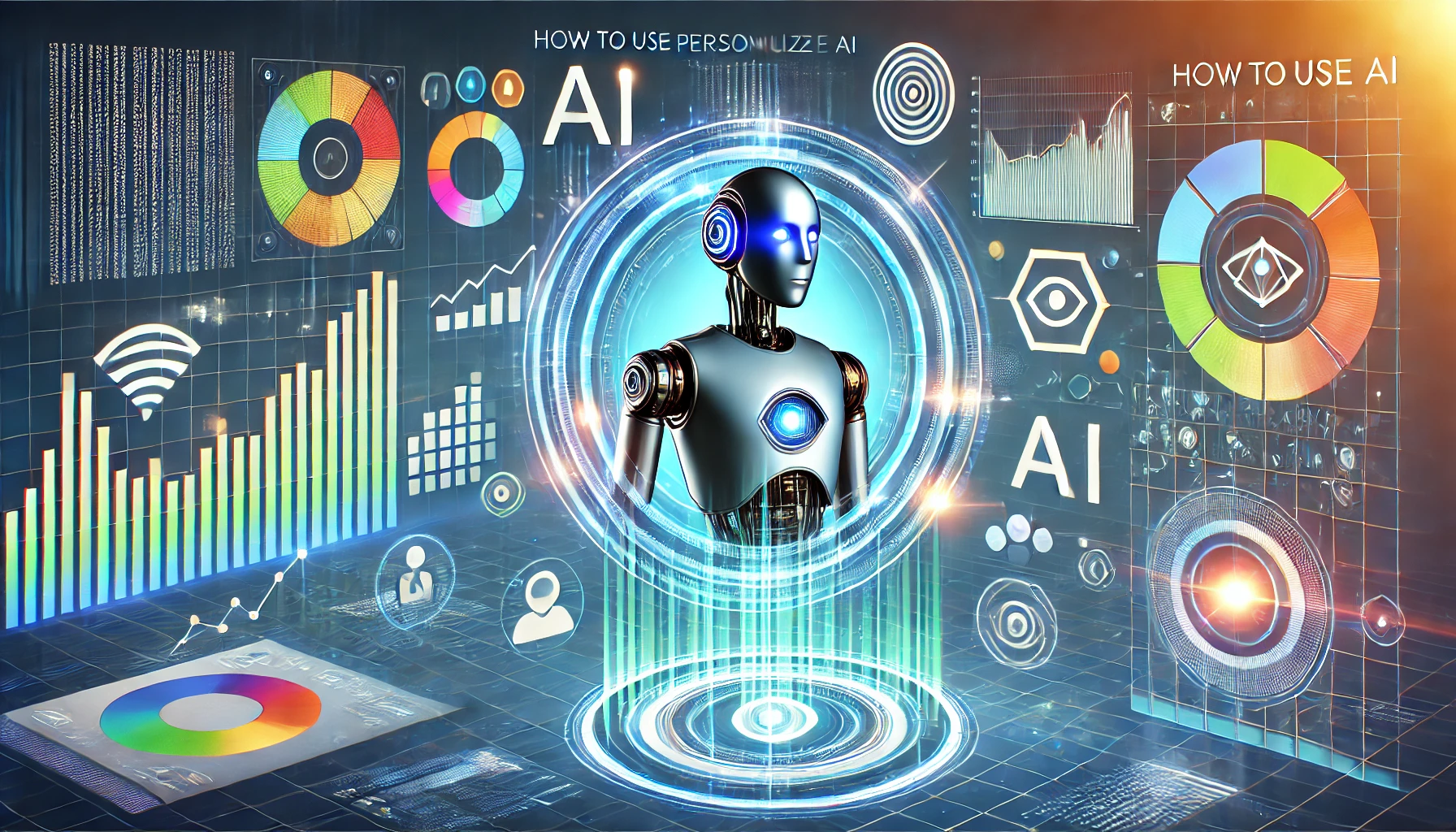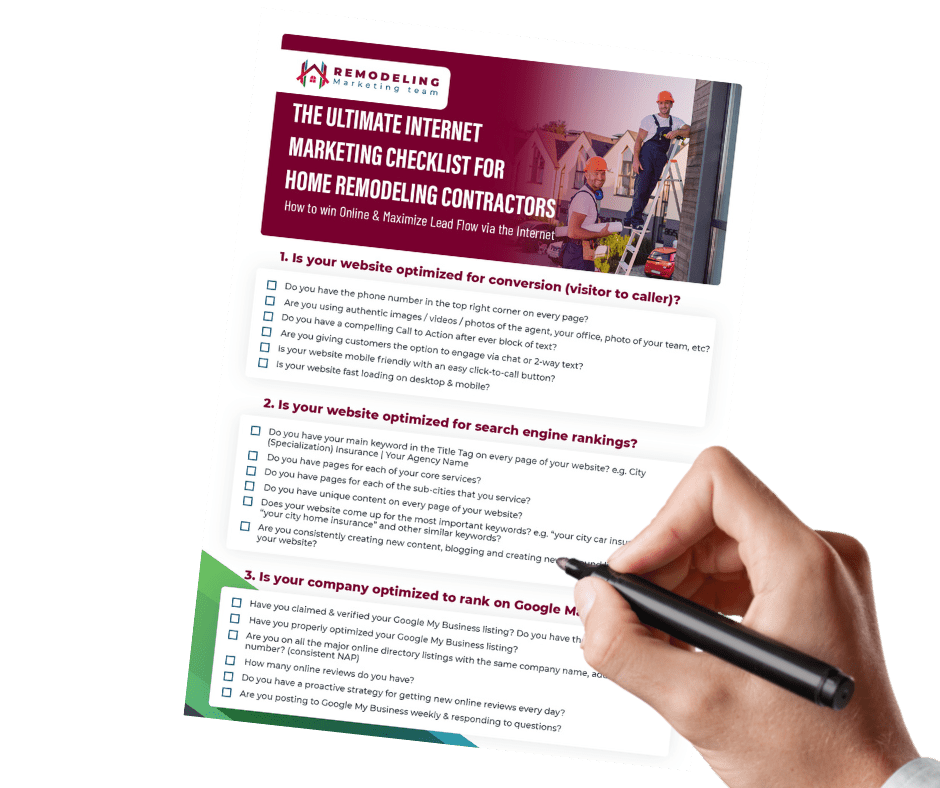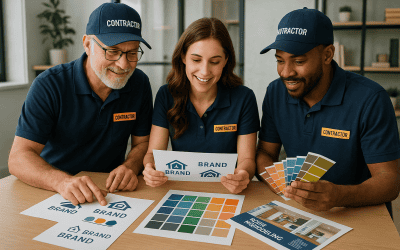In today’s fast-paced digital world, if you aren’t personalizing your marketing efforts, you’re leaving money on the table. For home remodeling companies, it’s not enough to send out generic emails or rely on word-of-mouth alone. Customers now expect a personalized experience, and businesses that deliver are seeing significant results in lead generation and conversions.
So how can you, as a home remodeler, provide that personalized experience? The answer is artificial intelligence (AI). AI helps you better understand your audience, create tailored marketing strategies, and, most importantly, increase conversions. In this article, I’ll walk you through how to leverage AI to take your marketing efforts to the next level.
Key Takeaways:
- AI Enhances Customer Experience: By tracking user behavior, AI allows home remodeling businesses to deliver personalized content and offers, leading to better customer engagement and satisfaction.
- Personalization Drives Higher Conversion Rates: AI can tailor marketing efforts based on individual customer preferences, increasing the likelihood of conversion by offering relevant services and content.
- Improved Customer Loyalty Through Personalization: AI helps nurture relationships by sending personalized follow-ups and offers, which fosters long-term loyalty and repeat business.
- AI Makes Marketing More Cost-effective: By focusing on specific customer segments and behaviors, AI enables more targeted, efficient marketing efforts, reducing wasted spend and maximizing ROI.
- AI Tools for Audience Insights: Platforms like Google Analytics and HubSpot help gather and analyze customer data, enabling businesses to segment their audience and create highly personalized marketing strategies.
- Content Personalization is Critical: AI-driven tools like Persado and Mailchimp enable the creation of tailored content and email campaigns, ensuring each message resonates with its intended audience.
- Measuring AI’s Impact: Using analytics tools and A/B testing, businesses can track the effectiveness of personalized campaigns, refine strategies, and calculate the return on investment.
- AI Increases Conversions: By implementing AI-driven personalization strategies, home remodeling businesses can significantly improve conversion rates, boost engagement, and foster long-term customer relationships.
The Benefits of Personalized Marketing
Personalized marketing isn’t just the latest trend—it’s become the expectation. With AI, the opportunities to create tailored, customer-centric experiences are endless, and the rewards speak for themselves. Let’s look at the key benefits:
1. Enhanced Customer Experience
AI allows you to deliver what your clients want, when they want it. By tracking user behavior, AI ensures that your marketing messages resonate with each individual. Take, for example, a potential client browsing your site for bathroom renovation ideas. AI can automatically follow up with them by sending a personalized email offering a free consultation on bathroom remodeling or showcasing a guide with the latest trends.
This level of personalization not only keeps your business top of mind, but it shows clients you understand their needs—and that kind of attention is what leads to long-term relationships.
2. Higher Conversion Rates
Here’s the truth: customers are much more likely to engage with businesses that tailor their experience. Research backs this up—personalization has been shown to boost conversion rates by as much as 15%. AI enables you to tailor your content based on customer interests, actions, and preferences.
For instance, instead of displaying the same homepage to every visitor, you can use AI to dynamically show kitchen renovation tips to one visitor and bathroom remodeling success stories to another. This kind of tailored experience speaks directly to each potential client’s needs, making it more likely they’ll take the next step.
3. Improved Customer Loyalty
Customer loyalty isn’t just about getting someone to come back; it’s about making them feel valued. AI can help you nurture these relationships by sending personalized follow-ups or offering exclusive deals tailored to your client’s past projects or interactions with your company.
For example, after completing a kitchen renovation, AI could trigger a personalized offer for discounted bathroom upgrades a few months later, reinforcing their trust in your services.
4. Cost-Effective Marketing
One of the biggest advantages AI brings to the table is efficiency. You no longer have to rely on broad, expensive marketing campaigns that target everyone and anyone. Instead, AI allows you to focus on the customers most likely to convert, saving you time and money. By honing in on specific behaviors and preferences, AI helps you stretch your marketing budget while driving better results.
AI Tools for Understanding Audience Behavior and Preferences
You can’t personalize your marketing until you understand who your audience is and what they want. AI helps by collecting and analyzing customer data, giving you the insights you need to make informed decisions.
1. Data Collection & Segmentation
AI-powered tools like Google Analytics, HubSpot, and machine learning algorithms allow you to collect vast amounts of data on your customers, whether they’re browsing your website, reading your emails, or interacting on social media. AI then helps segment these users into groups based on their behaviors and interests.
For example, if you see that certain visitors are consistently engaging with your content about outdoor renovations, you can create a targeted campaign specifically for them. By segmenting your audience, you can ensure that each message is relevant, leading to better engagement and higher conversions.
2. Behavioral Targeting
Once you’ve gathered data, the next step is using AI to target customers with precision. Major players like Amazon and Netflix have set the bar for this—AI analyzes customer behavior to suggest products or content based on past interactions. You can do the same in your home remodeling business by offering recommendations for services or products based on what customers have already shown interest in.
For instance, if a customer has visited your website’s page on kitchen remodels multiple times, AI can trigger a special offer for kitchen renovation services, increasing the likelihood that they’ll take action.
3. Predictive Analytics
With AI’s predictive analytics, you don’t have to wait for customers to tell you what they need—you can anticipate it. Tools like IBM Watson and Salesforce Einstein use AI to predict customer behavior, allowing you to meet their needs before they even know what they want.
In the remodeling industry, predictive analytics can help you forecast when a past client might be ready for their next project. Perhaps they’ve completed a bathroom remodel and, based on their browsing habits and time spent on your site, AI predicts they’re likely considering a kitchen upgrade next.
4. Real-time Personalization
Real-time personalization is where AI truly shines. Tools like Dynamic Yield and Adobe Experience Cloud allow you to customize your website content as customers interact with it. A first-time visitor might see general information, but a returning visitor who’s been researching bathroom remodels can be greeted with tailored content, such as recent case studies, pricing information, or limited-time offers for that specific service.
Creating Personalized Content and Offers Using AI
Once you have insights into your audience’s behavior, the next step is to create personalized content that speaks to their needs and interests. This is where AI’s ability to customize emails, web content, and product recommendations comes into play.
1. Content Personalization
AI tools like Persado and Copy.ai can generate customized content for your emails, blog posts, and social media channels. For example, you could create a blog post titled “Top Kitchen Remodeling Trends for Growing Families” for one audience segment while offering another group tips on “How to Maximize Space in a Small Bathroom.” Each piece of content feels personal to the reader because it speaks directly to their interests.
2. Email Campaigns
Email marketing is one of the most effective ways to engage with your audience, and AI makes it even more powerful. Platforms like Mailchimp, Klaviyo, and Drip allow you to send highly personalized email campaigns. For instance, if a customer has spent time on your website looking at outdoor remodeling ideas, AI can automatically send them an email featuring recent outdoor renovation projects, complete with a call to action for a free consultation.
3. AI-driven Chatbots and Virtual Assistants
AI-powered chatbots, like those offered by Intercom and Drift, can provide personalized assistance to customers 24/7. These bots use data to offer product recommendations, guide visitors to relevant services, or answer questions in real-time, all while creating a personalized experience based on the customer’s behavior.
4. Dynamic Landing Pages and Product Recommendations
AI can also be used to create dynamic landing pages that change based on each visitor’s preferences. Tools like Unbounce and Instapage allow you to personalize landing pages to reflect the specific services or products a customer has shown interest in, dramatically increasing your chances of converting them into a lead.
Imagine a visitor who has been exploring bathroom renovations on your site. When they return, they are greeted with a landing page featuring bathroom remodel success stories, pricing information, and a call to action to schedule a free consultation—all perfectly aligned with their interests.
Measuring the Effectiveness of AI Personalization
To truly maximize the power of AI, you need to track its effectiveness. AI not only helps you create personalized content but also gives you the tools to measure and refine your marketing efforts.
1. Key Metrics to Track
- Conversion Rate: Keep an eye on how your personalized campaigns are turning visitors into leads and customers.
- Engagement: Track how much time users spend on your site, how often they return, and how they interact with your content.
- Customer Lifetime Value (CLV): Use AI to increase the lifetime value of your customers by encouraging repeat business through personalized follow-ups and offers.
2. AI-driven Analytics Tools
Tools like Google Analytics 4 and HubSpot provide deep insights into user behavior, allowing you to see which personalized campaigns are driving the most engagement and conversions.
3. Feedback Loops and A/B Testing
AI-driven tools like VWO and Optimizely make it easy to run A/B tests on personalized content. By testing different approaches, you can continuously refine your messaging to achieve better results over time.
4. ROI Calculation
It’s important to calculate the return on investment (ROI) from your AI efforts. Compare the cost of the AI tools you’ve implemented against the increase in leads, sales, and overall customer engagement.
Hypothetical Case Study: Increased Conversions through AI-driven Personalized Marketing
Let’s consider how AI could transform the results of a mid-sized home remodeling company.
Client Overview
This company generates a steady flow of website traffic but struggles with low conversion rates. Despite potential clients browsing the site, few actually fill out the contact form or schedule consultations.
AI Implementation
Using AI tools like HubSpot, the company segments visitors based on their behavior. Customers frequently exploring bathroom remodeling pages are targeted with personalized email campaigns, offering tips, case studies, and exclusive discounts on bathroom renovations. Meanwhile, dynamic landing pages and chatbots assist visitors, offering personalized recommendations based on their past interactions.
Results
Within three months, the company sees a 35% increase in conversions and 50% higher engagement with email campaigns. The AI-driven personalized approach also leads to a 20% increase in repeat customers, showing that tailored marketing creates long-term benefits.
Conclusion
The future of marketing is personalized, and AI is the key to unlocking that potential. Whether you’re looking to improve customer engagement, increase conversions, or build loyalty, AI offers the tools and insights you need to grow your business. By integrating AI into your marketing strategy, you can create experiences that feel personal, meaningful, and, most importantly, effective.
Ready to personalize your marketing and boost conversions?
Contact the Remodeling Marketing Team today to schedule a free strategy session. Let us show you how AI can transform your marketing efforts and drive real results for your remodeling business.
FAQs:
What is personalized marketing?
Personalized marketing is the practice of tailoring marketing content and offers to individual customers based on their behavior, preferences, and interactions with your business. It helps create a more relevant and engaging experience for each customer, which leads to higher conversions and better customer retention.
How does AI help with personalized marketing?
AI collects and analyzes customer data to understand their preferences, behaviors, and needs. With this information, AI can customize content, emails, landing pages, and even product recommendations in real time, providing each customer with a unique, personalized experience that is more likely to result in conversions.
What AI tools can I use to personalize my marketing?
There are many AI-powered tools available, including:
Intercom and Drift for AI-driven chatbots that offer personalized customer service.
Google Analytics and HubSpot for data collection and segmentation.
Persado and Copy.ai for personalized content creation.
Mailchimp, Klaviyo, and Drip for customized email campaigns.
Dynamic Yield and Adobe Experience Cloud for real-time personalization.
How does AI improve conversion rates?
AI enables you to tailor your marketing efforts based on individual customer preferences. By showing relevant content, offers, or services, AI increases the likelihood of customers taking the next step, whether it’s filling out a form, scheduling a consultation, or making a purchase.
Can AI really improve customer loyalty?
Yes, AI helps businesses build long-term relationships by continuously engaging customers with personalized follow-ups, reminders, and tailored offers. By addressing their specific needs and preferences, AI fosters trust and loyalty, encouraging customers to return for future projects.
Is AI expensive to implement for small and mid-sized businesses?
The cost of AI tools varies, but many affordable options are available, particularly for small and mid-sized businesses. Additionally, AI’s ability to streamline marketing efforts and improve targeting often leads to higher returns on investment, making it a cost-effective choice for many businesses.
How can I measure the success of AI-driven personalized marketing?
Key metrics to track include conversion rates, engagement (time spent on site, return visits), and customer lifetime value (CLV). AI tools like Google Analytics and HubSpot also provide deep insights into which personalized strategies are driving the most engagement and sales.
What is predictive analytics, and how does it help my business?
Predictive analytics is a type of AI that uses past customer behavior to forecast future actions. It helps businesses anticipate customer needs and offer personalized solutions before they even know they need them, which can significantly improve engagement and conversions.
How can I get started with AI-driven marketing for my home remodeling business?
Begin by identifying areas where personalization can enhance your marketing—such as email campaigns, website content, or customer service. Implement AI tools to collect data, segment your audience, and deliver personalized content. To maximize the effectiveness of these tools, consider partnering with experts like the Remodeling Marketing Team for a personalized strategy session.
What are the long-term benefits of using AI in marketing?
In the long run, AI-driven marketing helps businesses build stronger customer relationships, increase sales, and improve overall marketing efficiency. By continuously refining and personalizing the customer experience, AI helps businesses stay competitive and grow sustainably.
This article is a collaboration between Carl Willis and OpenAI’s ChatGPT. Created on September 16, 2024, it combines AI-generated draft material with Willis’s expert revision and oversight, ensuring accuracy and relevance while addressing any AI limitations.






